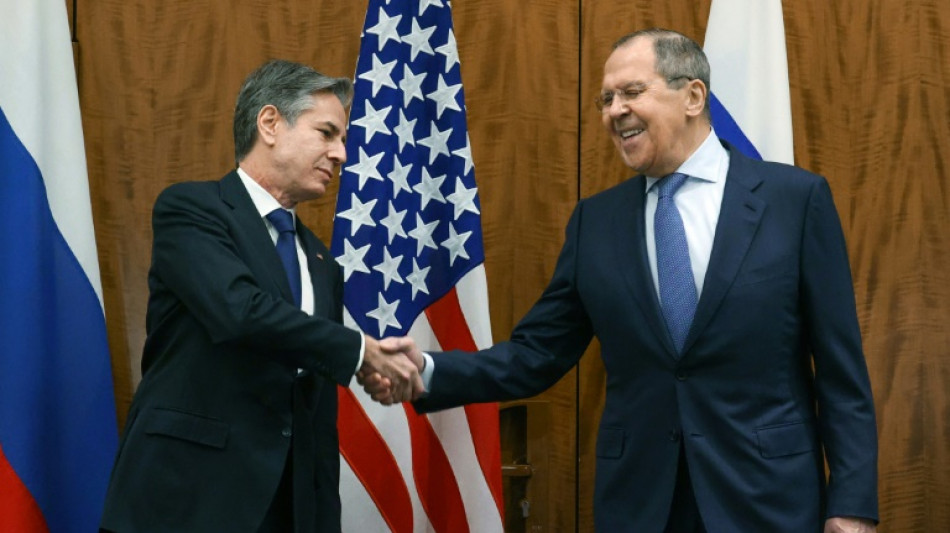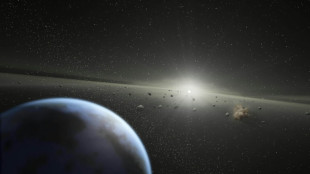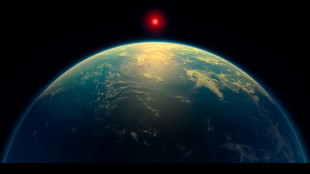
-
 Migrant's expulsion puts Washington Salvadorans on edge
Migrant's expulsion puts Washington Salvadorans on edge
-
Plan for expanded Muslim community triggers hope, fear in Texas

-
 Pakistan foreign minister due in Kabul as deportations rise
Pakistan foreign minister due in Kabul as deportations rise
-
White House touts Covid-19 'lab leak' theory on revamped site

-
 Dodgers star Ohtani skips trip to Texas to await birth of first child
Dodgers star Ohtani skips trip to Texas to await birth of first child
-
US senator says El Salvador staged 'margarita' photo op

-
 Ford 'adjusts' some exports to China due to tariffs
Ford 'adjusts' some exports to China due to tariffs
-
Thomas maintains two-shot lead at RBC Heritage

-
 US to withdraw some 1,000 troops from Syria
US to withdraw some 1,000 troops from Syria
-
Four killed after spring storms wreak havoc in the Alps

-
 Spurs' Popovich reportedly home and well after 'medical incident'
Spurs' Popovich reportedly home and well after 'medical incident'
-
Trump goes to war with the Fed

-
 Celtics chase second straight NBA title in playoff field led by Thunder, Cavs
Celtics chase second straight NBA title in playoff field led by Thunder, Cavs
-
White House site blames China for Covid-19 'lab leak'

-
 Norris edges Piastri as McLaren top Jeddah practice
Norris edges Piastri as McLaren top Jeddah practice
-
Trump warns US could ditch Ukraine talks if no progress

-
 Judge denies Sean 'Diddy' Combs push to delay trial
Judge denies Sean 'Diddy' Combs push to delay trial
-
80 killed in deadliest US attack on Yemen, Huthis say

-
 Lebanon says two killed in Israeli strikes in south
Lebanon says two killed in Israeli strikes in south
-
Trump says US will soon 'take a pass' if no Ukraine deal

-
 F1 success is 'like cooking' - Ferrari head chef Vasseur
F1 success is 'like cooking' - Ferrari head chef Vasseur
-
Cycling mulls slowing bikes to make road racing safer

-
 Macron invites foreign researchers to 'choose France'
Macron invites foreign researchers to 'choose France'
-
Klopp 'happy' in new job despite Real Madrid rumours: agent

-
 Alcaraz into Barcelona semis as defending champion Ruud exits
Alcaraz into Barcelona semis as defending champion Ruud exits
-
Vance meets Italy's Meloni before Easter at the Vatican

-
 Evenepoel returns with victory in Brabantse Pijl
Evenepoel returns with victory in Brabantse Pijl
-
Maresca confident he will survive Chelsea slump

-
 Mob beats to death man from persecuted Pakistan minority
Mob beats to death man from persecuted Pakistan minority
-
Lebanon says one killed in Israeli strike near Sidon

-
 Arsenal's Havertz could return for Champions League final
Arsenal's Havertz could return for Champions League final
-
US officials split on Ukraine truce prospects

-
 Client brain-dead after Paris cryotherapy session goes wrong
Client brain-dead after Paris cryotherapy session goes wrong
-
Flick demands answers from La Liga for 'joke' schedule

-
 'Maddest game' sums up Man Utd career for Maguire
'Maddest game' sums up Man Utd career for Maguire
-
Trial opens for students, journalists over Istanbul protests

-
 Gaza rescuers say Israeli strikes kill 24 after Hamas rejects truce proposal
Gaza rescuers say Israeli strikes kill 24 after Hamas rejects truce proposal
-
'Really stuck': Ukraine's EU accession drive stumbles

-
 'Not the time to discuss future', says Alonso amid Real Madrid links
'Not the time to discuss future', says Alonso amid Real Madrid links
-
74 killed in deadliest US attack on Yemen, Huthis say

-
 Southgate's ex-assistant Holland fired by Japan's Yokohama
Southgate's ex-assistant Holland fired by Japan's Yokohama
-
Vance meets Meloni in Rome before Easter at the Vatican

-
 Ryan Gosling to star in new 'Star Wars' film
Ryan Gosling to star in new 'Star Wars' film
-
Hamas calls for pressure to end Israel's aid block on Gaza

-
 Russia says Ukraine energy truce over, US mulls peace talks exit
Russia says Ukraine energy truce over, US mulls peace talks exit
-
58 killed in deadliest US strike on Yemen, Huthis say

-
 Museums rethink how the Holocaust should be shown
Museums rethink how the Holocaust should be shown
-
Three dead after deadly spring storm wreaks havoc in the Alps

-
 No need for big changes at Liverpool, says Slot
No need for big changes at Liverpool, says Slot
-
Bloody Philippine passion play sees final performance of veteran 'Jesus'


Cold War flashbacks in Russia-US talks in Geneva
Geneva, the neutral turf that was once host to so much Cold War bargaining, is again welcoming Russian and US officials to discuss missiles, nuclear arms and spheres of influence on the eve of a possible conflagration.
There is a heavy whiff of the 20th-century East-West power struggles in the Swiss capital, a flashback to the tense period between World War II and the Soviet Union's collapse in 1991, when the fate of the world often appeared to hang in the balance.
The two rival camps are beginning to openly make the comparison themselves, even if observers note significant differences.
"What we're having now we have is kind of a remake of the Cold War, Cold War 2.0," Dmitri Polyansky, the Russian deputy ambassador to the United Nations, said last month, putting the blame on the United States.
In Berlin, the city once split by a wall that became the emblem of the Cold War, US Secretary of State Antony Blinken warned Thursday that any Russian invasion of Ukraine, which Westerners fear could happen at any moment, would bring the world back to a time "when this continent, and this city, were divided in two... with the threat of all-out war hanging over everyone's heads."
- 'Brinkmanship' -
The similarities are striking.
Firstly, the geographical split is identical, with Moscow facing down the West.
Military, too, there is once again the risk that a local conflict fought by proxy forces could degenerate into a much larger and more direct confrontation of great powers.
And as in the heyday of the Cold War, the two powers have rallied their allies and defended their spheres of influence in a classic display of realpolitik bloc logic.
While the Americans suspect the Russians of wanting to use Belarus as a rear base for a potential offensive in Ukraine, NATO, the transatlantic alliance that the United States recently tried to redirect towards China, has rediscovered its raison d'être from the time of its founding in 1949, namely to defend non-Soviet Europe from a possible attack by Moscow.
Russian President Vladimir Putin, a former KGB officer, is practicing "Cold War-style brinksmanship, threats and intimidation intended to burnish Putin's image as a strongman," Sarah Kreps, a professor at Cornell University, told AFP.
From the location of the talks to the vocabulary used and the issues on the table, it all has a vintage feel as the two sides haggle over the deployment of missiles and troops at the gates of the opposing bloc.
- Less ideology -
However, John Bolton, who served as national security advisor to former US president Donald Trump, noted that the current face-off lacks the ideological ingredient of Communism versus liberal democracy that "shaped the Cold War."
"What we're looking at now is much more a kind of typical nineteenth-century power-politics confrontation, and I don't think it's infused by ideology,” he said.
"The immediate issue that we face is not just Ukraine, but is Putin's effort to either reassert Russian control over the former Soviet Union or at a very, very, very bare minimum, establish Russian hegemony over it,” he said.
For Bolton, the current crisis is the culmination of a long drift borne of the blindness of Western leaders and thinkers who were lulled in the 1990s by the illusion of a world without major conflict and did not see that Moscow had never really accepted the dissolution of its empire. That was something Putin referred to in 2005 as the "greatest disaster" of the last century.
"Putin is both patient and agile," said Bolton, adding that the process has "not not been exactly fast, but it's been consistent," referring to the Russian military intervention in Georgia in 2008 then the annexation of Ukrainian Crimea in 2014.
If crisis erupts today, it is also because the US has partly withdrawn from the world stage -- President Joe Biden has made it clear that he has no intention of directly involving the United States in a new conflict.
"Clearly in Putin's mind, Russia is destined to be a great power” Bolton said, and the Russian leader likely resents that Beijing has replaced it in the role of Washington's number one rival.
Cold War or not, the strategic stakes have hardly changed. At the time, "there were nuclear weapons -- a lot of them -- but deterrence worked. Neither side was going to provoke a nuclear war because no one would win that war," said Kreps.
"Very little about that dynamic has changed other than the individuals involved, but the most important thing -- the strategic calculus -- remains the same.”
She warned that "we will see these types of crises come and go," but in the future, as in the Cold War of the past, "deterrence will keep a lid on major escalatory action.”
W.Lapointe--BTB



